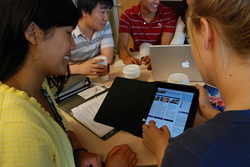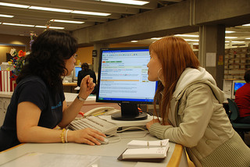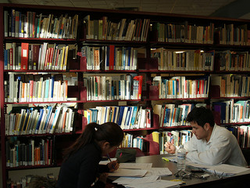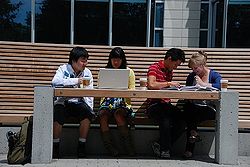Library:Faculty Information Literacy Toolkit/Assignment Design
Assignment Design
UBC Research Assignment Examples
The following are examples of real assignments from real UBC instructors and faculty which effectively communicate to students the importance of one or more of the 5 major information literacy skill areas. While these assignments are drawn from various disciplines and different levels of study, each of them exemplifies the kind of careful scaffolding that can assist students in practicing and developing these skills. Each assignment has been annotated with commentary indicating the strong information literacy components it contains.
- Example 1 - PSYC 101 Article Summary, courtesy of Paul Wehr
- Example 2 - PSYC 208 Group Project with Annotated Bibliography, courtesy of Catherine Rawn
- Example 3 - LAW 180 Research Journal, courtesy of George Tsiakos
Examples from Other Institutions
- PSYC 110 source evaluation in three parts, from the Association of College & Research Libraries
Information Literacy Checklists
The Association of College and Research Libraries (ACRL) has developed a set of Information Literacy Competency Standards to describe in detail what information literate individuals should be able to do in their interactions with information – specifically, in the college environment, their interaction with the research process.
From the large and, at times, broadly stated guidelines provided by the ACRL, we have attempted to create a series of questions, organized into checklists grounded in five major information literacy areas. In the footnotes for each checklist you will find the ACRL Competencies on which the questions were built.
The purpose of these checklists is to assist in maximizing assignment potential and to enhance and build student information literacy skills.
For a printable checklist with references, download as a PDF.
Scoping the Information Need

Does the assignment..
![]() Communicate to students that they must narrow and/or modify the topic, likely through formulating specific questions, to achieve a manageable focus?
Communicate to students that they must narrow and/or modify the topic, likely through formulating specific questions, to achieve a manageable focus?
![]() Build on key concepts, terms and resources that have been explored in class, and/or direct students to them?
Build on key concepts, terms and resources that have been explored in class, and/or direct students to them?
![]() Encourage and equip students to create an appropriate research plan (eg, a timeline for the steps involved in completing the assignment)?
Encourage and equip students to create an appropriate research plan (eg, a timeline for the steps involved in completing the assignment)?
![]() Provide guidance to students as to how and where to begin the research process, and indicate potential reference sources?
Provide guidance to students as to how and where to begin the research process, and indicate potential reference sources?
Finding Information

Does the assignment...
![]() Include links and/or referrals to appropriate resources, such as library resources and librarians?
Include links and/or referrals to appropriate resources, such as library resources and librarians?
![]() Equip students to recognize, comprehend and utilize search strategies and data-gathering techniques appropriate/necessary to the discipline/subject being studied?
Equip students to recognize, comprehend and utilize search strategies and data-gathering techniques appropriate/necessary to the discipline/subject being studied?
![]() Encourage students to see the research process as a learning experience, through which to acquire new skills that will serve them after the course is over?
Encourage students to see the research process as a learning experience, through which to acquire new skills that will serve them after the course is over?
![]() Encourage students to learn (in class and/or at the library) and use a variety of search strategies (keyword searching, browsing, citation chaining, etc), gathering important search terms as they encounter them?
Encourage students to learn (in class and/or at the library) and use a variety of search strategies (keyword searching, browsing, citation chaining, etc), gathering important search terms as they encounter them?
![]() Make explicitly clear the types of resources students are expected to use, and indicate or refer to likely starting points for research in the scholarly and popular literature of the discipline being studied (particular databases, search engines, journals, reference sources, sections of the library)?
Make explicitly clear the types of resources students are expected to use, and indicate or refer to likely starting points for research in the scholarly and popular literature of the discipline being studied (particular databases, search engines, journals, reference sources, sections of the library)?
Evaluating Information

Does the assignment...
![]() Encourage students to consult a variety of sources and to compare their usefulness and relevance before settling on the best sources to use?
Encourage students to consult a variety of sources and to compare their usefulness and relevance before settling on the best sources to use?
![]() Explain, or encourage students to explore, differing viewpoints on the topic?
Explain, or encourage students to explore, differing viewpoints on the topic?
![]() Provide the student with the knowledge and practice necessary to efficiently assess the quality of information sources found during the research process?
Provide the student with the knowledge and practice necessary to efficiently assess the quality of information sources found during the research process?
![]() Prepare the student to identify, differentiate, and assess the usefulness of different types of resources (visual/textual; primary/secondary; popular/scholarly; current/historical; etc)?
Prepare the student to identify, differentiate, and assess the usefulness of different types of resources (visual/textual; primary/secondary; popular/scholarly; current/historical; etc)?
Reading Information

Does the assignment...
![]() Ensure that students are aware of effective reading strategies appropriate to the materials and/or discipline being studied, encouraging the use of techniques for such as notetaking, highlighting, and scanning?
Ensure that students are aware of effective reading strategies appropriate to the materials and/or discipline being studied, encouraging the use of techniques for such as notetaking, highlighting, and scanning?
![]() Clarify for students that they will need to engage, respond to, and integrate information gathered through research in order to generate their own arguments and conclusions?
Clarify for students that they will need to engage, respond to, and integrate information gathered through research in order to generate their own arguments and conclusions?
![]() Ensure that students are aware that reading for academic research requires examination and comparison of methods, data, and conclusions in the resources they read?
Ensure that students are aware that reading for academic research requires examination and comparison of methods, data, and conclusions in the resources they read?
![]() Provide students with guidance and resources to assist them in collecting, organizing, and storing their research appropriately and reliably?
Provide students with guidance and resources to assist them in collecting, organizing, and storing their research appropriately and reliably?
Using Information

Does the assignment...
![]() Assist students in learning how to create a synthesis of their own ideas and the ideas they uncover through research?
Assist students in learning how to create a synthesis of their own ideas and the ideas they uncover through research?
![]() Equip students to create an organized, polished final product focussed on a central purpose or thesis, in an appropriate, engaging format?
Equip students to create an organized, polished final product focussed on a central purpose or thesis, in an appropriate, engaging format?
![]() Communicate to students that their final product should demonstrate their growth and development as scholars, and their understanding of the process of research and writing?
Communicate to students that their final product should demonstrate their growth and development as scholars, and their understanding of the process of research and writing?
![]() Support students in the design and execution of their final product, providing samples, guidelines, and resources as necessary?
Support students in the design and execution of their final product, providing samples, guidelines, and resources as necessary?
![]() Clarify the expected citation style(s), and direct students to useful, comprehensible resources to assist them in citation, appropriate use of copyrighted materials, and avoidance of plagiarism?
Clarify the expected citation style(s), and direct students to useful, comprehensible resources to assist them in citation, appropriate use of copyrighted materials, and avoidance of plagiarism?